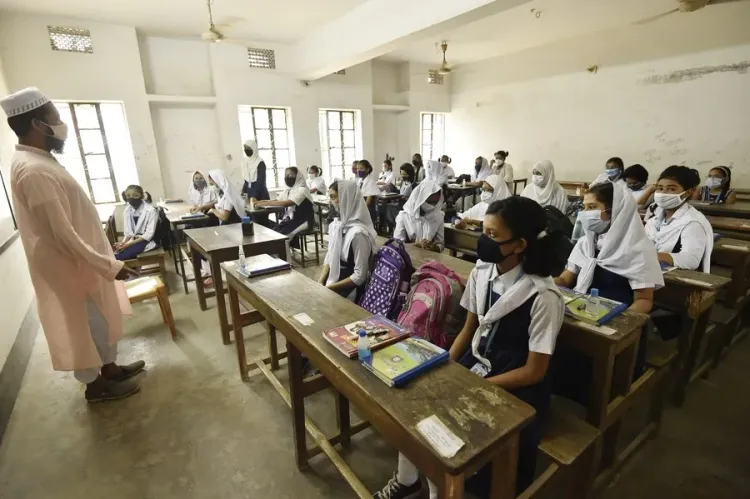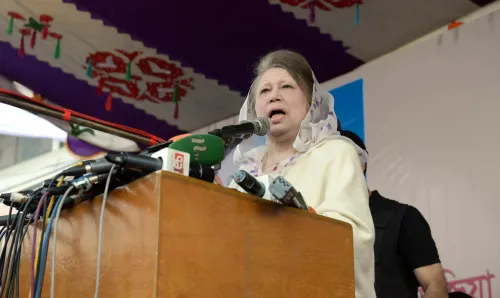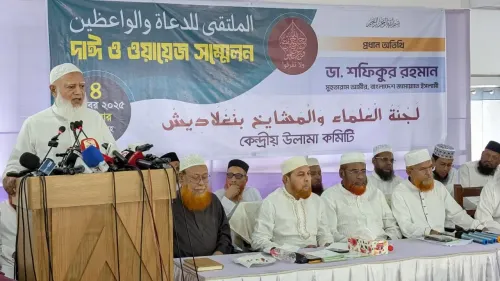Why Did the Yunus Government in Bangladesh Cancel Music and PE Teacher Posts?

Synopsis
Key Takeaways
- Bangladesh government cancels music and PE teacher posts.
- Decision influenced by radical organizations.
- Concerns over cultural secularism and minority rights.
- Reports indicate rising communal violence against minorities.
- Reversal of educational reforms signals troubling trends.
Dhaka, Nov 4 (NationPress) The government of Bangladesh has decided to revoke its initiative to establish positions for music and Physical Education (PE) instructors in public primary schools, following backlash from various extremist groups, according to local media reports on Tuesday.
The Ministry of Primary and Mass Education in Bangladesh issued a revised gazette on Sunday, amending the Government Primary School Teachers Recruitment Rules 2025, as reported by The Daily Star. This updated gazette excluded two new teaching roles that were part of the previous gazette published on August 28.
Masud Akhtar Khan, Additional Secretary of the ministry's School Division, stated, "A revised gazette has been released. The earlier version outlined four categories of teachers, while the new one features only two. The roles of assistant teachers for music and physical education are no longer part of the plan."
He declined to elaborate on whether this decision stemmed from external pressures, suggesting, "Please refer to higher authorities for that information."
The previous gazette had proposed two new assistant teacher roles for music and PE, alongside other assistant teaching positions. Educators had praised the authorities for this move, considering it a much-needed advancement in promoting creativity and holistic education at the primary level.
However, a number of Islamist groups, including Hefazat-e-Islam, Islami Andolan Bangladesh, Jamaat-e-Islami, Khelafat Majlish, Bangladesh Khelafat Majlish, and Bangladesh Khelafat Andolan, condemned the authorities' decision and called for its retraction.
Since the fall of the Awami League government led by Sheikh Hasina in August 2024 and Mohammad Yunus' ascension as Chief Advisor to the interim government, Bangladesh appears to be regressing on various fronts, including political liberties, minority rights, economic stability, and, crucially, cultural secularism, as noted in an October report.
The report pointed out alarming trends of increasing religious intolerance, with secular symbols being targeted, folk traditions suppressed, and cultural icons, such as statues and murals, integral to Bangladesh's identity being destroyed.
According to a report by 'Times of Oman', the prevailing situation has fostered an environment of fear and self-censorship within the nation, eroding the once-vibrant public culture that celebrated diversity.
“Data compiled by the Bangladesh Hindu Buddhist Christian Unity Council shows 2,442 instances of communal violence from August 2024 to mid-2025, including murders, sexual assaults, attacks on religious sites, looting, vandalism, and property confiscations,” the report elaborated.
“In just the first half of 2025, there were 258 incidents targeting religious minorities, resulting in 27 murders, 59 assaults on places of worship, and widespread destruction of homes and businesses. Victims included men, women, and youth, many of whom were forced to flee their homes in fear,” it added.
The report highlighted that numerous minority groups accused the Yunus administration of overlooking these attacks, even when the culprits were known.
“With extremist factions like Jamaat-e-Islami re-emerging, there are growing concerns that the state is leaning towards appeasement or failing to tackle radical elements. Although formal alliances remain unclear, the noticeable rise in Islamist discourse, the cancellation of secular cultural events, and reduced protections for minority rights signal a troubling shift,” the report noted.









